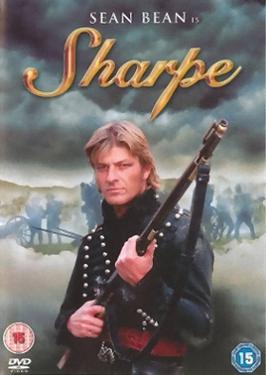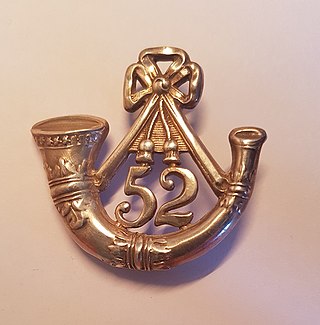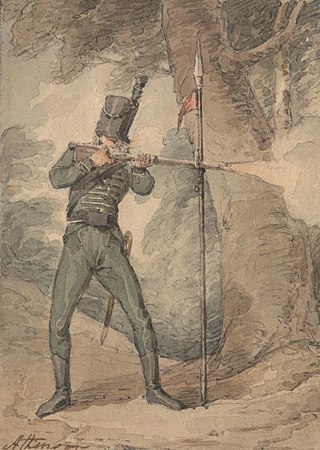Related Research Articles

Major-General Robert Craufurd was a British officer. After a military career which took him from India to the Netherlands, in 1810 in the Napoleonic Peninsular War he was given command of the Light Division, composed of the elite foot soldiers in the army at the time, under the Duke of Wellington. Craufurd was a strict disciplinarian and somewhat prone to violent mood swings which earned him the nickname "Black Bob". He was mortally wounded storming the lesser breach in the Siege of Ciudad Rodrigo on 19 January 1812 and died four days later.

Albert D. J. Cashier, born Jennie Irene Hodgers, was an Irish-born American soldier who served in the Union Army during the American Civil War. Cashier adopted the identity of a man before enlisting, and maintained it until death. Cashier became famous as one of at least 250 soldiers who were assigned female at birth and enlisted as men to fight in the Civil War. The consistent and nearly lifelong commitment to a male identity has prompted some historians to believe that Cashier was a trans man.

Sharpe is a British television drama series starring Sean Bean as Richard Sharpe, a fictional British soldier in the Napoleonic Wars, with Irish actor Daragh O'Malley playing his second in command, Patrick Harper. Sharpe and Harper are the heroes of the Sharpe series of novels by Bernard Cornwell; most, though not all, of the episodes are based on the books. Produced by Celtic Films and Picture Palace Films for the ITV network, the series was filmed mainly in Crimea, with recordings of other episodes in Turkey, England, Portugal and Spain. The two final episodes were filmed in Jaipur, India.

The Rifle Brigade (The Prince Consort's Own) was an infantry rifle regiment of the British Army formed in January 1800 as the "Experimental Corps of Riflemen" to provide sharpshooters, scouts, and skirmishers. They were soon renamed the "Rifle Corps". In January 1803, they became an established regular regiment and were titled the 95th Regiment of Foot (Rifles). In 1816, at the end of the Napoleonic Wars, they were again renamed, this time as the "Rifle Brigade".
The Light Division is a light infantry division of the British Army. It was reformed in 2022, as part of Future Soldier reforms.

A rifleman is an infantry soldier armed with a rifled long gun. Although the rifleman role had its origin with 16th century hand cannoneers and 17th century musketeers, the term originated in the 18th century with the introduction of the rifled musket. By the mid-19th century, entire regiments of riflemen were formed and became the mainstay of all standard infantry, and rifleman became a generic term for any common infantryman.
Benjamin Randell Harris was a British infantryman who served in the British Army during the Napoleonic Wars. He is most widely remembered today as the author of a memoir of his time in the army entitled The Recollections of Rifleman Harris (1848), which has been seen as giving a rare insight into the world of the enlisted man in Wellington's army. Most memoirs published after the war came from serving officers, and the experiences of ordinary soldiers were overlooked due to the illiteracy of so many people at that time.

The Walcheren Campaign was an unsuccessful British expedition to the Netherlands in 1809 intended to open another front in the Austrian Empire's struggle with France during the War of the Fifth Coalition. Sir John Pitt, 2nd Earl of Chatham, was the commander of the expedition, with the missions of capturing Flushing and Antwerp in the Netherlands and enabling navigation of the Scheldt River. Some 39,000 soldiers and 15,000 horses, together with field artillery and two siege trains, crossed the North Sea and landed at Walcheren on 30 July. This was the largest British expedition of that year, larger than the army serving in the Peninsular War in Portugal. Nevertheless, it failed to achieve any of its goals. The Walcheren Campaign involved little fighting, but heavy losses from the sickness popularly dubbed "Walcheren Fever". Although more than 4,000 British troops died during the expedition, only 106 died in combat; the survivors withdrew on 9 December.

The 95th (Derbyshire) Regiment of Foot was a British Army infantry regiment, raised in 1823. Under the Childers Reforms, it amalgamated with the 45th (Nottinghamshire) Regiment of Foot to form the Sherwood Foresters in 1881.

Jason Salkey is an English actor, best known for playing Harris, the "educated rifleman", in the television series Sharpe. Salkey has also published a book and video diaries about working in Sharpe alongside Sean Bean.
Sharpe's Rifles is the first of the Sharpe television dramas, based on Bernard Cornwell's 1988 novel of the same name. Shown on ITV in 1993, the adaptation stars Sean Bean, Daragh O'Malley and Assumpta Serna. It began a long series of successful and critically acclaimed television adaptations of the novels.
Sharpe's Gold is a 1995 British television drama, the sixth of a series screened on the ITV network that follows the career of Richard Sharpe, a British soldier during the Napoleonic Wars. The drama has almost nothing in common with the novel of the same name by Bernard Cornwell. Scriptwriter Nigel Kneale explained, "I didn't use much of [the book]. I used the first ten pages, I think. Then I had an idea which would be more fun to do. It was all about magic by the time I was through with it."
Sharpe's Regiment is a British television drama, the ninth of a series that follows the career of Richard Sharpe, a British soldier during the Napoleonic Wars. This episode is based on the 1986 novel of the same name by Bernard Cornwell.

The 52nd (Oxfordshire) Regiment of Foot was a light infantry regiment of the British Army throughout much of the 18th and 19th centuries. The regiment first saw active service during the American War of Independence, and were posted to India during the Anglo-Mysore Wars. During the Napoleonic Wars, the 52nd were part of the Light Division, and were present at most major battles of the Peninsula campaign, becoming one of the most celebrated regiments, described by Sir William Napier as "a regiment never surpassed in arms since arms were first borne by men". They had the largest British battalion at Waterloo, 1815, where they formed part of the final charge against Napoleon's Imperial Guard. They were also involved in various campaigns in India.

Samuel Henry Starr was a career United States Army officer, regimental commander and prisoner of war. A collection of his letters provide a rare view of military life, the War with Mexico, Indian conflicts, the Civil War, his fall from grace, recovery and post Civil War service. Despite his rough demeanor he was a religious man and reflective of the times he served.
Henry Curling was a novelist and captain in the 52nd Regiment of Foot, a light infantry unit in the British Army. Curling's works include The Soldier of Fortune, 1843; Shakespeare, a Romance, 1848; and Recollections of Rifleman Harris, 1848.
Major General Sir George Elder was a British Army officer who fought in the Napoleonic Wars, in the South American Expedition (1806–1807) and the Peninsular War. He was killed in an accident in Madras when he was thrown from his horse.
Major-General John Mitchell was a British Army officer and author.

Sir John Kincaid was an officer of the British 95th Regiment, The Rifle Brigade who wrote a first hand account of his service under Wellington through the Peninsula War and the Battle of Waterloo.
References
- ↑ John Harris was a fellow rifleman, but one whose movements do not match up with those recorded in the text. The narrator never provides his first name, and it is only through recent historical research that Rifleman Harris has been identified.